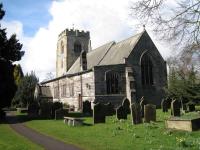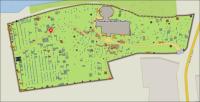-
Kids Can Do It
a crafting in cardboard and stripwood practical actvity day.
'standard' materials provided or bring your own.
pre-printed designs and patterns available to prepare at home first.
adults and teens welcome if accompanied by Under Year 7's they're helping
cafe open for teas, coffee and biscuits
-
From a website comment by Mr Derek Barker:""My father Jim Walker formerly a gas meter reader was born in a cottage adjacent to the church gates. Unfortunately I do not know which one of the pair he was born in. As a child he used the chair shown in the photographs. My father who passed away in 2004 told me that it was made from oak taken from Hampsthwaite Church. I make no claims as to its provenance but there is just a chance that it was made by Peter. The Teddy which gives scale to the chair is over 100 years old and belonged to my father in law Arthur Myers of Stubhouse Farm (Emmerdale site) in Harewood Park."
-
THIS COMING WEEKEND 21st and 22nd JUNE!I am delighted to announce that 38 young soldiers from22 Platoon at the Army Foundation College will be hosted here todo 'good works' around the village towards their Duke of Edinburgh Award.Please welcome them, thank them, and if you wish, join them!They will be working 1030hrs - 1530hrs around Feast Field on Saturday,followed by Memorial Hall then Village Centreand ending at the churchyard on Sunday.Our Community PayBack Team have kindly loaned several gardening tools,we have sourced others, but if you are able to loan any, especially clippers,trimmers, shears, forks or half moons etc. that would be very helpful.Please label them bring along to leave in the Memorial Hall Foyer
-
Local planning authorities need to regularly identify and update their supply of sites for housing development as part of their adopted local plan. North Yorkshire Council is currently drawing up a new county wide local plan and a new consultation (Issues and Options) is about to begin.
-
Our Memorial Hall was built to honour the fallen in two world wars and give thanks to those who returned. It is appropriate therefore that we play our full part in the national celebrations and village activities are planned for May 8th VE-Day and Saturday May 10th 2025
-
Remembering Hampsthwaite’s Blind Joiner - an article by Shaun WilsonLike the market town of Knaresborough, who had ‘Blind Jack’ – John Metcalf, the road builder of Yorkshire in the eighteenth century, the small rural village of Hampsthwaite had it’s blind hero also, almost a century later – Peter Barker who became known as ‘The Blind Joiner of Hampsthwaite.’ Though there are some similarities between John Metcalf and Peter Barker’s lives, these are purely co-incidental and each fulfilled a life, character and career in their own right.
-
Arsenic Poisoning in Hampsthwaite - The Execution of Hannah Whitley
In 1789, Hannah Whitley of Hampsthwaite used a pie as the delivery medium for a fatal dose of arsenic, with the poison concentrated in the crust. She claimed She had been coerced into the act of poisoning by her employer, a local linen weaver named Horseman, who was involved in an on-going feud with the intended victim.
-
JANE RIDSDALEAged 33 years, born at Hampsthwaite, near Harrogate, Yorkshire, her height is 31 ½ inches.She is remarkably chearfull & enjoys very good health.Published July 1st 1807 by Jane Ridstale, at Harrogate where purchasers of this Print will have the opportunity of seeing and conversing with her
-
Joshua Tetley was the founder of Tetley’s Brewery in Leeds, and he retired with his wife Hannah to Hollins Hall on the outskirts of Hampsthwaite (Hollins Hall Retirement Village).
-
SCRUBBERS & STONES - Sat 29th June 10.30am - 2.30pm - Entry FREE!
Explore the Memorials at St Thomas a'Becket
Memorials Treasure Trail - for children if all ages
Self-Service / Self-Checkout BBQ from 12 noon (inc. veg option) Food £2, Drink £1, Donations? - yes please!
Hot & Cold Drinks
Laptop & Screen to show Mapping Hampsthwaite’s Past
Use a Bucket & Brush to help reveal Inscriptions on the older memorials
. . . or just Sit & Enjoy CORPUS CHRISTI BRASS BAND . . . from 11.30am
. . . followed by Afternoon Tea & Cakes at the Memorial Hall!
© DT Online 2010 - 2025
| John
John Name Meaning
English and Welsh: ultimately from the Hebrew personal name Yoḥanan ‘Jehovah has favored (me with a son)’ or ‘may Jehovah favor (this child)’. This personal name was adopted into Latin (via Greek) as Johannes and has enjoyed enormous popularity in Europe throughout the Christian era being given in honor of Saint John the Baptist precursor of Christ and of Saint John the Evangelist author of the fourth gospel as well as the nearly one thousand other Christian saints who bore the name. Some of the principal forms of the personal name in other languages are: Welsh Ieuan Evan Siôn and Ioan; Scottish Ia(i)n; Irish Séan; German Johann Johannes; Dutch and Slavic Jan; French Jean; Italian Giovanni; Spanish Juan; Portuguese João; Greek Iōannēs (vernacular Giannis Yannis); Russian Ivan. There were a number of different forms of the name in Middle English including Jan(e) a male name (see Jayne ); Jen (see Jenkin ); Jon(e) (see Jones ); and Han(n) (see Hann ). By the beginning of the 14th century John rivalled William in popularity and has always been a favorite name. Johan became Jo(h)n and another Old French form Jehan was shortened to Jan and Jen giving rise to Old French and Middle English diminutives such as Jonin Janin and Jenin. More common in Middle English were Jankin Jonkin and Jenkin which were Middle Dutch pet forms introduced after the Conquest by Flemish and Picard settlers. The most common pet form of John was Jack another borrowing from Flemish and Picard usage. Han may sometimes have been a short form of Johan but was more usually a pet form of Henry. There were also various Middle English feminine versions of this name (e.g. Joan Jehan) some of which were indistinguishable from masculine forms. The distinction on grounds of gender between John and Joan was not firmly established in English until the 17th century. It was even later that Jean and Jane were specialized as specifically female names in English; bearers of these surnames and their derivatives are more likely to derive them from a male ancestor than a female. As a surname in the British Isles John is particularly frequent in Wales where it is a late formation representing Welsh Siôn rather than the older form Ieuan (which gave rise to the surname Evan ). In North America the English form of the surname has absorbed many cognates from other languages e.g. Assyrian/Chaldean Youkhana French Jean Hungarian János (see Janos ) Slovenian Janež and Janeš (see Janes ) Czech Jan Albanian Gjoni and their derivatives (see examples at Johnson ). The name John is also found among Christians in southern India (compare Ninan and Yohannan ) but since South Indians traditionally do not have hereditary surnames the southern Indian name was in most cases registered as such only after immigration of its bearers to the US. German: from a North German and Silesian variant of the personal name Johannes . This surname is also found in France (Alsace and Lorraine). Compare Yohn .
Source:
Dictionary of American Family Names 2nd edition, 2022
Similar surnames:
Jahn, Bohn, Hohn, Johns, Hahn, Mohn, Nohr, Rohn, Gohn, Sohn
From: https://www.ancestry.co.uk/learn/facts
Church Records | Calverley Info | Additional Information |
 Click on image to see article on church history
| Plot No. | Name | Burial Date | Age | | ## | J### | ### | ## | | ## | J### | ### | ## |
|
Calverley Info comprises an excellent and comprehensive collection of historical and genealogical information pertaining to Nidderdale in Yorkshire. Burial Records may be accessed using the links below and may be searched by holding down Ctrl and pressing F then typing in the Surname to be searched for.
The many other Records contained in Calverley Info may also be Searched similarly and, for a more general enquiry, the Calverley Info has its own Vital Records Database Search [Link]
Other Hampsthwaite Links  Family Search
|
 Hampsthwaite village website banner
Other Surname Links
|
 St. Thomas a'Becket Past Portal
Plot LocationsChurch of St. Thomas a'Becket, Church Lane, Hampsthwaite, Harrogate, HG3 2HB John John Name Meaning
English and Welsh: ultimately from the Hebrew personal name Yoḥanan ‘Jehovah has favored (me with a son)’ or ‘may Jehovah favor (this child)’. This personal name was adopted into Latin (via Greek) as Johannes and has enjoyed enormous popularity in Europe throughout the Christian era being given in honor of Saint John the Baptist precursor of Christ and of Saint John the Evangelist author of the fourth gospel as well as the nearly one thousand other Christian saints who bore the name. Some of the principal forms of the personal name in other languages are: Welsh Ieuan Evan Siôn and Ioan; Scottish Ia(i)n; Irish Séan; German Johann Johannes; Dutch and Slavic Jan; French Jean; Italian Giovanni; Spanish Juan; Portuguese João; Greek Iōannēs (vernacular Giannis Yannis); Russian Ivan. There were a number of different forms of the name in Middle English including Jan(e) a male name (see Jayne ); Jen (see Jenkin ); Jon(e) (see Jones ); and Han(n) (see Hann ). By the beginning of the 14th century John rivalled William in popularity and has always been a favorite name. Johan became Jo(h)n and another Old French form Jehan was shortened to Jan and Jen giving rise to Old French and Middle English diminutives such as Jonin Janin and Jenin. More common in Middle English were Jankin Jonkin and Jenkin which were Middle Dutch pet forms introduced after the Conquest by Flemish and Picard settlers. The most common pet form of John was Jack another borrowing from Flemish and Picard usage. Han may sometimes have been a short form of Johan but was more usually a pet form of Henry. There were also various Middle English feminine versions of this name (e.g. Joan Jehan) some of which were indistinguishable from masculine forms. The distinction on grounds of gender between John and Joan was not firmly established in English until the 17th century. It was even later that Jean and Jane were specialized as specifically female names in English; bearers of these surnames and their derivatives are more likely to derive them from a male ancestor than a female. As a surname in the British Isles John is particularly frequent in Wales where it is a late formation representing Welsh Siôn rather than the older form Ieuan (which gave rise to the surname Evan ). In North America the English form of the surname has absorbed many cognates from other languages e.g. Assyrian/Chaldean Youkhana French Jean Hungarian János (see Janos ) Slovenian Janež and Janeš (see Janes ) Czech Jan Albanian Gjoni and their derivatives (see examples at Johnson ). The name John is also found among Christians in southern India (compare Ninan and Yohannan ) but since South Indians traditionally do not have hereditary surnames the southern Indian name was in most cases registered as such only after immigration of its bearers to the US. German: from a North German and Silesian variant of the personal name Johannes . This surname is also found in France (Alsace and Lorraine). Compare Yohn .
Source:
Dictionary of American Family Names 2nd edition, 2022
Similar surnames:
Jahn, Bohn, Hohn, Johns, Hahn, Mohn, Nohr, Rohn, Gohn, Sohn
From: https://www.ancestry.co.uk/learn/facts
|